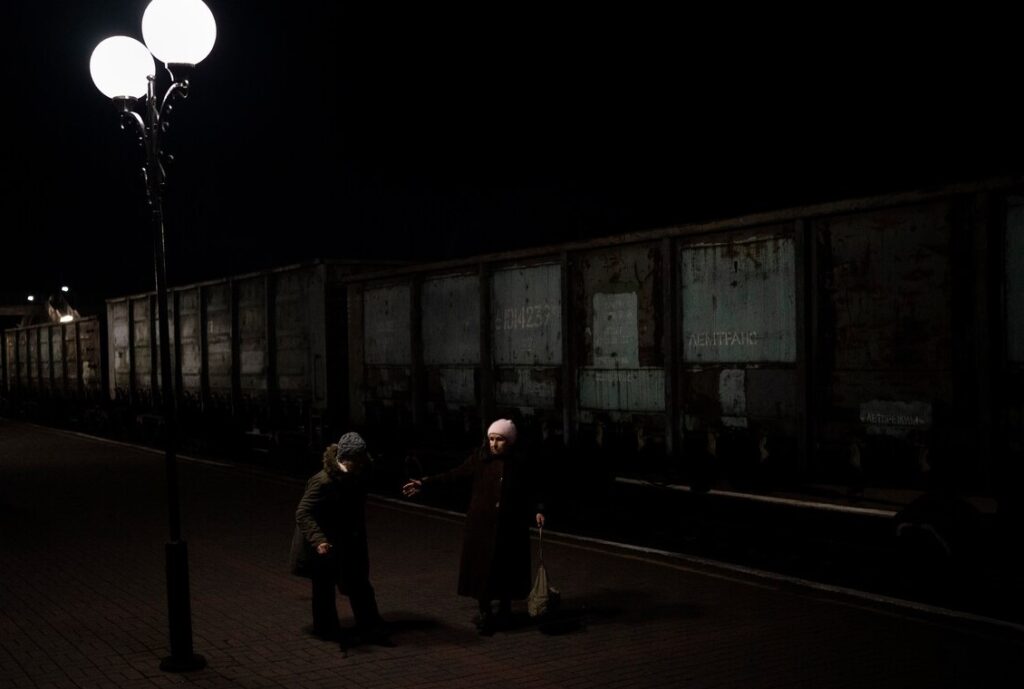The damage from Russian strikes on Ukrainian energy facilities is so severe that President Volodymyr Zelensky is urging residents and businesses to restrict their electricity use, even as temperatures drop. Conditions in the country at the onset of winter are grim, with the head of a major power provider warning of blackouts until at least the end of March.
Here’s the latest on the war and its ripple effects across the globe.
1. Key developments
Zelensky called on Ukrainians to limit energy use during peak periods. In his nightly address Monday, he said “the situation is particularly difficult” in the capital, Kyiv, as well as in the regions of Sumy in the northeast and Odesa on the Black Sea. After a major Russian missile attack on Ukraine’s energy infrastructure last week, the country has “practically no intact thermal and hydropower plants left,” Volodymyr Kudrytskyi, chairman of national power grid operator Ukrenergo, said at a news conference Tuesday.
The European Commission proposed an automatically triggered limit to gas prices in the event of extreme price hikes. Called a “Market Correction Mechanism,” the new instrument would protect Europeans from “episodes of excessively high gas prices” that are not in line with global market prices. The mechanism would act only as a “last resort,” said Kadri Simson, the E.U. energy commissioner. Energy ministers are set to meet Thursday to discuss the proposal, Euronews reported.
Defense Secretary Lloyd Austin discussed the war with his Chinese counterpart, Gen. Wei Fenghe. The Tuesday conversation “underscored how both the United States and China oppose the use of nuclear weapons or threats to use them,” the Pentagon said. The two met on the sidelines of a meeting of regional defense ministers in Siem Reap, Cambodia.
Ukraine’s SBU security service raided a 1,000-year-old Orthodox Christian monastery in the capital on Tuesday as part of operations to counter what it described as “subversive activities by Russian special services.” The Kyiv Pechersk Lavra Monastery houses the Russian-linked part of Ukraine’s Orthodox Church, which follows the Moscow Patriarchate. A spokesman for the Russian Orthodox Church, whose head, Patriarch Kirill, has supported Moscow’s war in Ukraine, called the search an “act of intimidation.”
In his nightly address on Tuesday, Zelensky announced a new initiative to create more than 4,000 centers across the country that will provide basic supplies and services in areas where Russian strikes damage electricity to a point where it cannot be restored “within hours.” Called the “Points of Invincibility” project, the centers will be free and available 24/7, Zelensky said.
2. Battleground updates
Ukrainian prosecutors said they uncovered suspected torture sites in Kherson after Russian forces withdrew from the city earlier this month. Investigators found parts of rubber batons, a wooden bat, an apparatus allegedly used to torture civilians with electric current, and bullets in the walls. The Washington Post could not independently verify the claims. U.N. officials have noted “patterns” of torture committed by Russia in Ukraine.
Russia’s State Duma, or lower house of parliament, adopted a resolution Tuesday condemning the alleged killings of Russian prisoners of war by Ukrainian forces and calling on Western nations to stop supporting Kyiv. The U.N. Human Rights Office is reportedly looking into videos that had circulated online in recent days and that the Kremlin said showed Ukrainian forces executing Russian prisoners of war. Ukraine said Monday it would investigate the footage, the Associated Press reported.
The United States is closely tracking recent footage that allegedly shows Ukrainian forces executing Russian troops, the U.S. envoy for global criminal justice, Beth Van Schaak, said in a briefing with reporters Tuesday. “It’s really important to emphasize that the laws of war apply to all parties equally, both the aggressor state and the defender state, and this is in equal measure,” she said. “We would urge Ukraine to continue to abide by international obligations in this conflict.”
3. Global impact
Norway, a vital natural-gas supplier in Europe, will develop a new gas field in the Norwegian Sea in 2026, the Energy Ministry said Tuesday. The Nordic country has become increasingly central to Europe’s energy security as the war pushed the continent into an energy crisis and Moscow cut off flows in retaliation for Western sanctions.
Moscow will not be invited to the 2023 Munich Security Conference, which is scheduled for February, according to Chairman Christoph Heusgen. “We want to discuss Russia’s future with Russian opposition leaders and exiled people — THEIR voices need to be heard and amplified,” Heusgen added on Twitter. Russia skipped the conference this year, which took place as it was massing troops on Ukraine’s borders.
The World Bank on Tuesday announced an additional $4.5 billion in funding for Ukraine, bringing the total support facilitated by the organization to $17.8 billion. The latest grant financing comes from the United States, World Bank Group President David Malpass said in a statement, adding that the institution will continue mobilizing funds to help Ukraine “meet vital needs for its citizens.”
Despite opposition from Ukrainian officials, the Italian opera house Teatro alla Scalla will move forward with the Russian opera “Boris Godunov” for its Dec. 7 season opening, the Associated Press reported. Dominique Meyer, the opera house’s general manager, said the Russian piece “contains no propaganda” for the country’s government, according to the AP.
Ahead of a planned Dec. 5 price cap on Russian oil, the Treasury Department’s Office of Foreign Assets Control (OFAC) released new guidelines Tuesday about maritime transport of crude oil. OFAC also finalized a determination prohibiting the “exportation, reexportation, sale, or supply, directly or indirectly” of Russian crude oil from the United States or by a U.S. person, according to the published document.
